There are typically three types of super contributions:
For most people, your employer must pay an amount equal to 9.5% of your salary into your super fund account. This is on top of your salary or wages. Over the course of your working life, these contributions from your employer add up, or ‘accumulate’, which is why they are known as accumulation funds. Your super money is invested by your super fund so you will earn investment returns on the money.
Employer contributions are based on your ‘ordinary time earnings’. For example, if your ordinary time earnings are $50,000 then you should be paid an additional $4,750 into super. Ordinary time earnings are what you earn for ordinary hours of work including over-award payments, bonuses, commissions, allowances and certain paid leave. See the ATO’s information on using ordinary time earnings to calculate the super guarantee.
Super contributions if you’re self-employed
If you are self-employed you are responsible for making your own super contributions, but they are tax deductible.
You can make extra contributions by:
If you put your own after-tax money into super, you could receive a government co-contribution, depending on how much money you earn. Low income earners can receive up to an extra $500 by making personal after tax contributions.
If you earn up to $37,000 you may also get a ‘low income super tax offset’ of up to $500 from the government. You don’t need to add extra money to your super to be eligible for this payment. Both of these payments will be paid into your super automatically after you have lodged your tax return.
